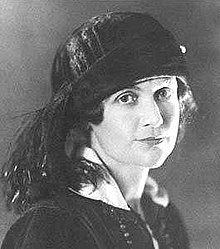Dorothea Mackellar
Isobel Marion Dorothea Mackellar , better known as Dorothea Mackellar , OBE (born July 1, 1885 in Sydney , † January 14, 1968 there ), was an Australian poet and novelist.
Her poem My Country is very well known in Australia.
Life
Dorothea Mackellar was born on July 1, 1885, the third child and only daughter of doctor and member of Parliament Sir Charles Mackellar and his wife Marion in Point Piper, a borough of Sydney. She received home schooling and traveled extensively with her parents. She was fluent in French, Spanish, German and Italian and attended some lectures at the University of Sydney, but without pursuing a degree. Dorothea Mackellar moved between the company of Sydney's intellectuals, life on her family's estate and her friends in London. She started writing at a young age and surprised her family when magazines not only published but paid for her verses and prose pieces. Although she grew up in an urban setting, Mackellar's poetry is considered to be the epitome of bush poem in Australia . Visits to her brothers' farms near Gunnedah in northwest New South Wales, where she witnessed a severe drought, shaped Dorothea Mackellar's perception of the Australian landscape and nature and inspired her to write about them.
During a trip to Europe at the age of 19, with a touch of homesickness , she wrote her most famous poem, My Country . This poem was first published in 1908 in London's The Spectator magazine as Core of My Heart . In Australia this poem appeared in 1911 in the volume of poetry The Closed Door under the title My Country . The second stanza of this poem is very well known throughout Australia.
In addition to The Closed Door (1911), the volumes The Witch Maid, and Other Verses (1914), Dreamharbour (1923) and Fancy Dress (1926) were published, which contained collected poems by Mackellar. She also published novels, first as the sole author of Outlaw's Luck (1913) and then in collaboration with Ruth Bedford The Little Blue Devil (1912) and Two's Company (1914).
Dorothea Mackellar was engaged twice between 1911 and 1914. She ended the first relationship because she felt overly protected by her partner. Their second relationship suffered from misunderstandings and poor communication at the time of World War I and was subsequently also ended. Nor did she later marry and have no children.
Dorothea Mackellar looked after her aging parents. After her father's death in 1926, she stopped writing her own poems. Occasionally she made powerful translations of little-known Spanish and German poets. In the 1930s Dorothea Mackellar was active in the Sydney literary scene. She was involved in the Sydney Publishers, Editors and Novelists Club , the Bush Book Club New South Wales, and was actively involved in establishing the PEN Sydney office. Her mother died in 1933. Dorothea Mackellar spent the last years of her life in poor health and therefore lived temporarily in a nursing home. After falling at her home in Darling Point, she was taken to hospital, where she died of injuries on January 14, 1968 at the age of 82. She is buried in Waverley Cemetery in Sydney's east.
Selection of works
- The Closed Door , Australasians Authors' Agency, Melbourne, 1911
- Outlaw's Luck , Mills & Boon, London, 1913 (novel)
- The Witchmaid, and Other Verses , JM Dent & Sons, London, 1914
- Dream Harbor , Longmans, Green and Co., London, 1923
- Fancy Dress , Angus & Robertson, Sydney, 1926
Honors
On January 1, 1968, two weeks before her death, Dorothea Mackellar was awarded the Officer's Cross of the Order of the British Empire for her contribution to Australian literature .
An electoral district in Sydney and a street in Cook, a suburb of the Australian capital Canberra , were named after Mackellar.
On Australia Day , January 26, 1983, a memorial to Dorothea Mackellar was unveiled and inaugurated in Gunnedah.
In 1984 the Dorothea Mackellar Poetry Awards were held in Gunnedah for the first time , which has developed into a nationwide poetry competition for Australian students.
In 1991 the Sydney Writers Walk was established at Circular Quay on a footpath between the cruise terminal and the Sydney Opera House . Among the 60 metal plaques embedded in the floor is a plaque in honor of Dorothea Mackellar.
Web links
- Audio: First stanza of the poem My Country, performed by Dorothea Mackellar in 1958
- Dorothea Mackellar Poetry Awards
Individual evidence
- ↑ a b c d Kingston, Beverley: Mackellar, Isobel Marion Dorothea (1885–1968). In: Australian Dictionary of Biography. Melbourne University Press, accessed June 11, 2020 .
- ^ Mackellar, Isobel Marion Dorothea (1885–1968). In: The Encyclopedia Of Women & Leadership In Twentieth-Century Australia. Retrieved June 11, 2020 .
- ↑ a b c Dorothea Mackellar statue. Monument Australia, accessed June 11, 2020 .
- ^ Dorothea Mackellar's My Country. New South Wales State Library, accessed June 11, 2020 .
- ^ Profile of division of Mackellar (NSW). Australian Electoral Commission, accessed June 11, 2020 .
- ^ History Of The Awards. The Dorothea Mackellar Memorial Society, accessed June 11, 2020 .
| personal data | |
|---|---|
| SURNAME | Mackellar, Dorothea |
| ALTERNATIVE NAMES | Mackellar, Isobel Marion Dorothea (full name) |
| BRIEF DESCRIPTION | Australian poet, novelist and translator |
| DATE OF BIRTH | July 1, 1885 |
| PLACE OF BIRTH | Sydney , Australia |
| DATE OF DEATH | January 14, 1968 |
| Place of death | Sydney , Australia |

